Posted in Liner Notes, What's New
The Legacy of Euriah Pillar
LINER NOTES:
In response to listener requests for more background information on the shows, how they were made and how the series evolved we are introducing Liner Notes, meant to hearken back to the good-ole-days of record albums and the sometimes treasure trove of material to be found on the back covers and on the album sleeves. This impromptu history is intended to be that, tossing in memories, photographs, artwork, reviews and backstage gossip that, if nothing else, will supply the listener with something for the eyes to peruse while the ears are listening.
We’ll even throw in a few recorded bloopers from time to time, of which there were plenty.
Steven Thomas Oney
The Legacy of Euriah Pillar
Recorded at: HT Recording Studio, Dennis, Cape Cod
Play’s location: Vicinity of Barnstable/ West Barnstable on Cape Cod
First broadcast: WOCB September 1982
Trivia: Laine Davis plays not only the part of Audrey Pillar but all other female voices in the play as well.
Actors:
Announcer . . . . . . . . . . . . . Floyd Pratt *
Captain Waverly Underhill . . . Dave Ellsworth *
Doctor Alexander Scofield . . . . . Wally O’Hara *
Leander Pillar . . . . . . . . . . . . .Kevin Groppe *
Audrey Pillar . . . . . . . . . . . . . Laine Davis *
Simon Pillar . . . . . . . . . . . . . . Robert Mazzette *
Horatio Salazar, Esquire . . . . Sean Herlihy *
Waitress . . . . . . . . . . . Charlene Goudrealt *
(*) First appearance in a CCRMT program
Author’s Notes: The Legacy of Euriah Pillar was Cape Cod Radio Mystery Theater’s first radio mystery and the first Captain Underhill story conceived entirely as a radio play. The story idea developed as I was recuperating from an illness and, for curiosity sake, went one afternoon and sat in on Probate Court at the Barnstable Court House in Barnstable Village just to see what went on there. Afterwards I began pondering what sort of bizarre Last Will and Testament an eccentric person might devise. (by the way, the unusual spelling of ‘Euriah’ is not a mispelling but the way I saw it written on an old Cape Cod tombstone.)
.Steven Oney in 1982
Once the script was ready to go, I placed an announcement in the local papers seeking actors. Enthusiastic response resulted in two full nights of auditions. The auditions were held at the Cape Cod Community College and one of the first to show up was Wally O’Hara. What a distinctive radio voice! Perfect for Scofield! Plus he could really act!
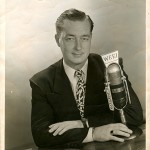
Wally was already a familiar voice to many radio listeners not only on Cape Cod but in Boston as well. For years he had been the principal news announcer at the big commercial station WEEI. When Wally ‘retired’ to the Cape, he performed the same duties at WOCB in West Yarmouth.
Another person who showed up the first night of auditions was Laine Davis. Like Wally, Ms. Davis was already a familiar voice to many Cape radio listeners. She worked at WOCB as well where twice daily she broadcast the commercial fishing report to all the fishermen at sea. (Note: Laine later served as the inspiration for the character of Molly Neptune in CCRMT’s mystery, The Case of the Calico Lobster.)
One aspect of radio theater that makes it particularly egalitarian is that when it comes to acting it is not so important how you look, but how you sound. Radio can be a haven for actors with golden throated voices but with only ordinary or mediocre looks. For those, however, blessed with good looks as well as a good voice, radio can seem like a tragic squandering of talent, sort of like hiding one’s light under a bushel. Ms. Davis belongs to this latter category. No male member of the cast or crew ever complained about working extra hours when Ms. Davis was on the set.
Kevin Groppe, who plays Leander Pillar, was another who showed up on the first night of auditions. As did Sean Herlihy who plays the shyster lawyer, Horatio Salazar. Another who came was Floyd Pratt. Floyd, a heavy smoker with a gruff voice, had done some hard living, however, he was always a jovial presence in the studio,although in a kind of Long John Silver kind of way. In fact, if you were to go in search of someone to play the part of a perfect pirate you couldn’t do better than Floyd. Supply him an eye patch, a tri-cornered hat and a green parrot on his shoulder and he would look like he was straight out of Central Casting.
Following the two nights of auditions all of the parts in the play were cast with the exception of the central character, the detective, retired police captain, Waverly Underhill. This part proved the hardest to fill.
Although there are obvious overtones to Captain Underhill to the great Sherlock Holmes, the character was also an amalgam of two real people, 1) my wife’s great uncle, Jimmy Develin of Philadelphia, who possessed the same sardonic wit; and my own dear uncle, Scott B. Radcliffe, who was the head of the State Highway Patrol in Ohio. An intrepid and unflappably cool customer, Scott Radcliffe came from cowboy beginnings in Montana, started out as a motorcycle patrolman in Ohio and, after several acts of death-defying heroism, rose to the highest position in the Highway Patrol. Uncle Scotty proved both a role model and a source of many useful police facts and lore. I was a teenager when he retired from the Highway Patrol and began making police training films which proved nothing but pure grist for the aspiring mystery writer, (although he didn’t know it then). Films like: how to spot shop-lifters and how to secure and search a warehouse were some of the topics.
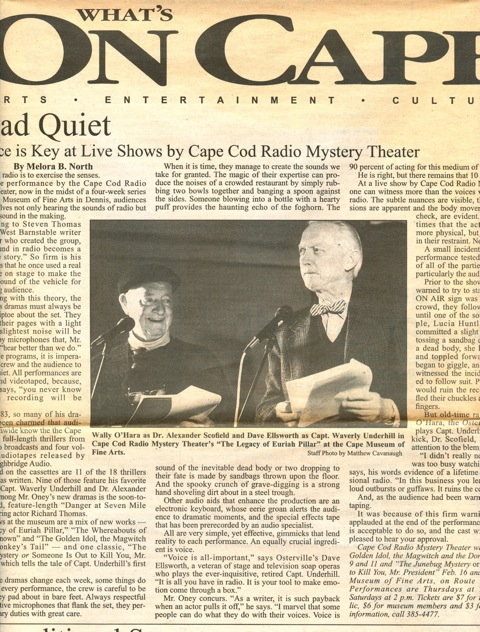
A recommendation from a local acquaintance finally led me to an actor in Osterville, Dave Ellsworth, who was then regularly commuting to New York City to appear in the long running TV soap, All My Children. Dave and I met and he fit the bill superbly with an acting ability that nicely complimented Wally O’Hara’s. I remember my only reservation at the time was that his voice didn’t sound quite as old as I imagined the part should be. (As the years have passed, however, Dave has generously cooperated, transforming himself into an older version of himself to better fit the part)
The Legacy of Euriah Pillar was recorded at HT Recording Studio. HT was John Todd’s converted, garage recording studio. Built off the side of his house, the only way to reach the bathroom was to invade their private living space. (Note to Jean Todd: your forbearance will forever be acknowledged for allowing the steady stream of perfect strangers to traipse through your dining room and kitchen at all hours of the day and night).
The dialogue for Euriah Pillar was recorded over several evenings. No rehearsals were done, we began on page one and keep going in a stop/start fashion until we reached the end. After all the dialogue was complete, John and I and an invited friend of his, Scott Dickie, all worked together to layer in the sound effects and sound beds: the fog horn was created by blowing across an empty beer bottle; the bell buoy by tapping an aluminum funnel with a metal knife; door sounds were studio doors; the motorcycle pulling up was Dave pulling up on his; the cricket sound bed was recorded just outside the studio as were the digging sounds; and Underhill’s car pulling up, which sounds on the recording like a rattle-trap Model T, was actually Scott’s rattle-trap Karmin Gia.
Scott Dickie multi-tasking
Both Scott and John were multi-talented professional musicians. They also knew their way around recording studios, especially John who could deftly handle his Otari half-track and his 8 track TEAC as nimbly as if he were a skilled brain surgeon –the comparison is especially apt when you consider the tricky edits of audio tape splicing that John had to perform wielding his razor blade like a scalpel.
Captain Underhill and Doctor Scofield regularly meet at the Dock Street Chowder House, a fictional restaurant. There is no Dock Street and no chowder house; however its location has always been in my mind somewhere along the wharf of Hyannis’ Inner Harbor. There is another restaurant mentioned in the script, Fiddle-Jacks, which came from the blending of the names of two real restaurants in Hyannis, Fiddlebees and Wack-a-Jacks. Both no longer exist.
Foley Girls in Portland performance of Euriah Pillar/Annie blows the foghorn, Janice Gray rings the bell buoy
The music cues and theme music were supplied by Mark Birmingham of Cotuit.
Mark and I had gotten together through a mutual acquaintance, Betsy Doriss. Betsy plays the oboe in the Cape Cod Symphony.
When I mentioned to her that I was working on an attempt to revive the genre of Radio Mystery Theater, she said she had the perfect person I had to meet: an accomplished composer and concert pianist who was interested in writing music for films.
Mark and I met one afternoon. We discussed our ideas for the project and what kind of musical cues would be needed. Mark went home that night and returned the very next day having composed and recorded 5 different possibilities of theme music. The first one was the best and the one we chose. It was catchy. It had a nice tip-toeing, Alfred Hitchcock feel to it suggestive of fun and suspense. Used in every program since, Mark’s inspired theme has become the most recognizable element of the series.
to order a CD:
https://ccrmt.com/catalog/product_info.php?cPath=1_22&products_id=44&osCsid=5101fc35ea81c3a8aed4459d64faa428
(TO BE CONTINUED)

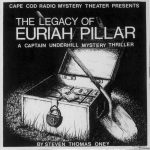
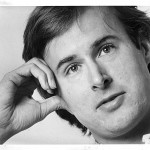
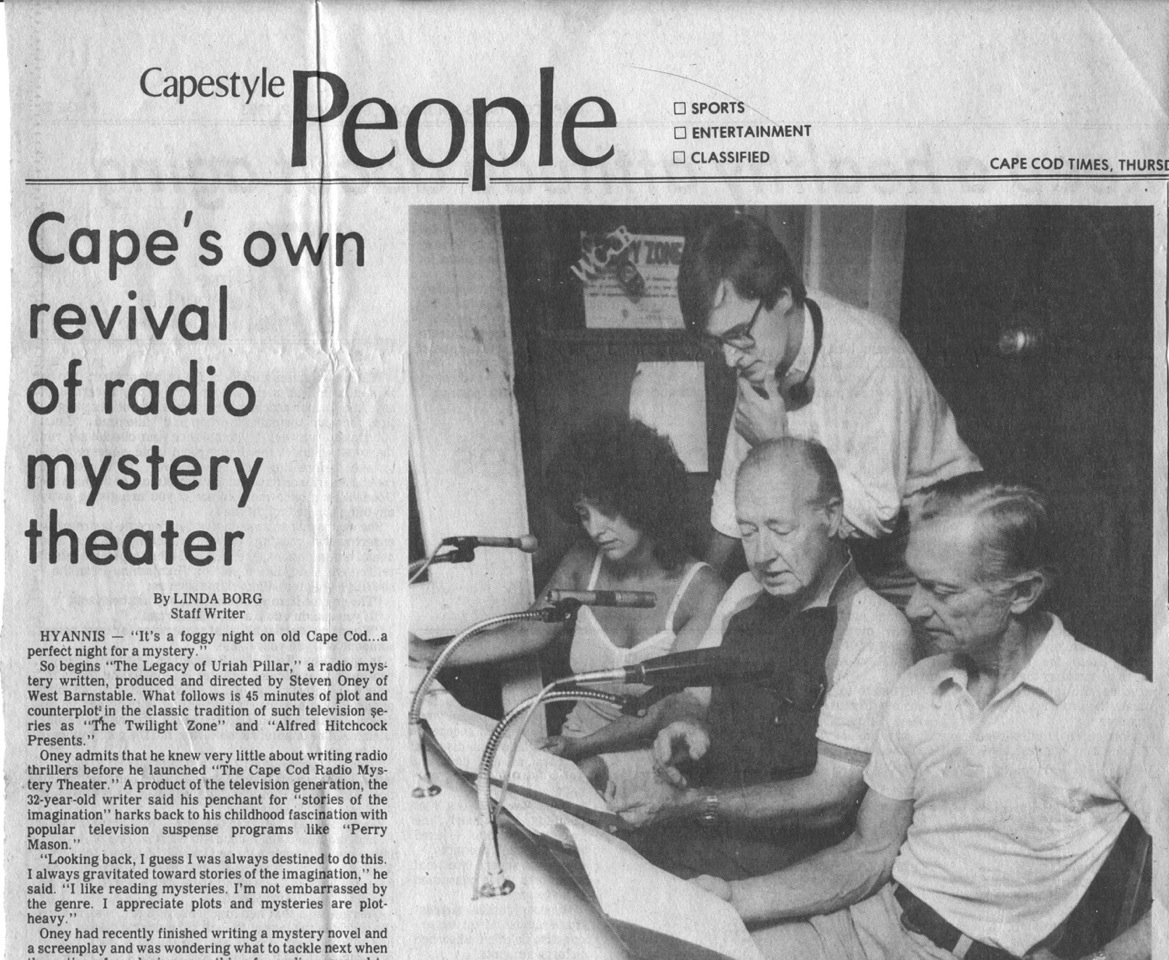

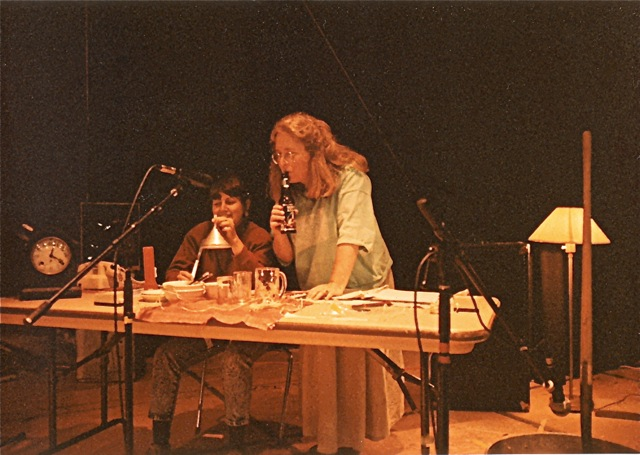
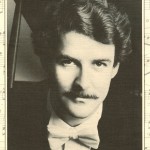
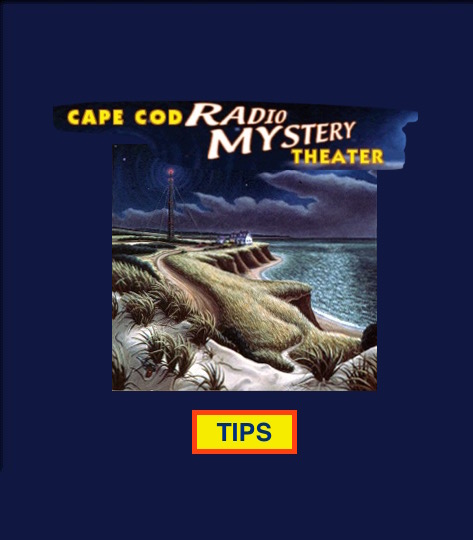

I am looking for a fine artist I once knew from Manchester Ct. Scott Dickey. The artwork of Euriah Pillar looks like his work. Would you pass on my contact info please. Many thanks!
Wendy Elder